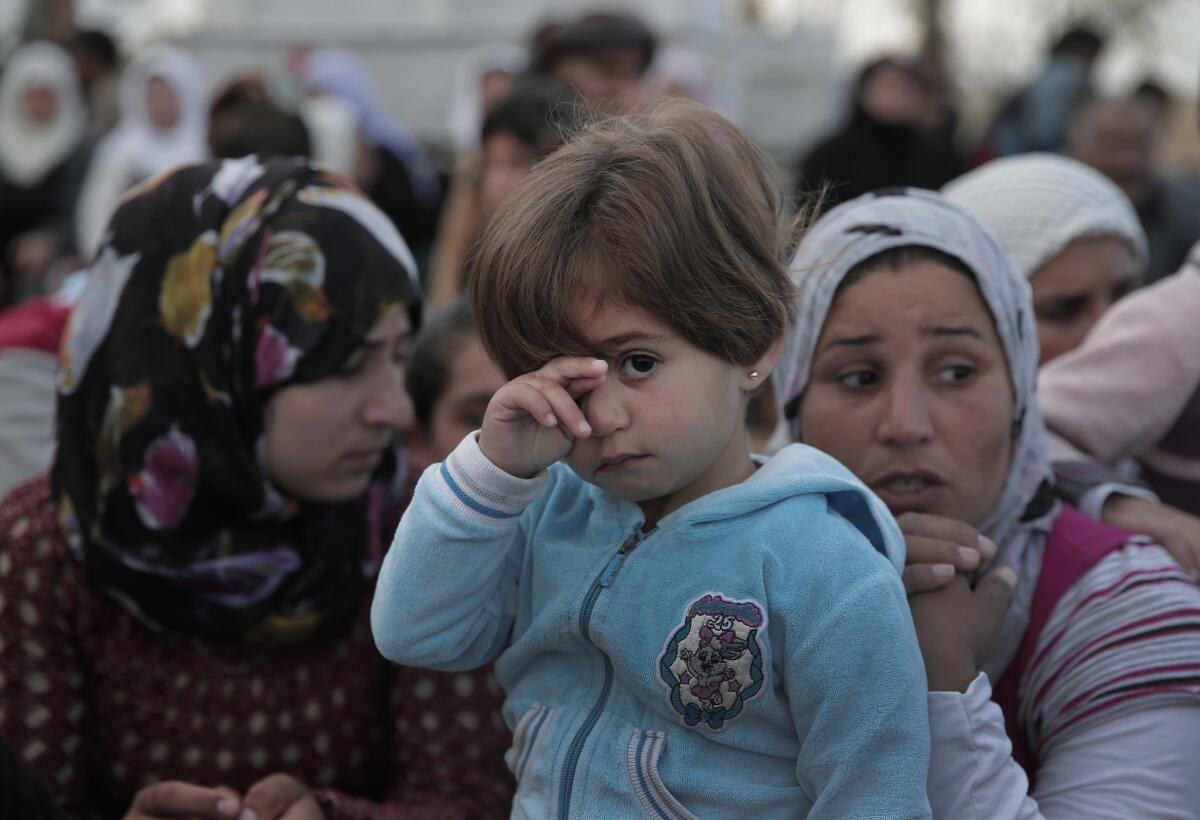Iraqi Kurdish fighters to help battle extremists in Kobani, Syria

Lawmakers in Iraq’s semiautonomous Kurdish region on Wednesday approved the deployment of fighters known as peshmerga to aid fellow Kurds battling Islamic State militants in the northern Syrian city of Kobani.
The Kurdistan Parliament in Irbil, capital of Iraqi Kurdistan, approved the deployment with wide support, local news reports said.
“This is a big turning point in Kurdish history,” said Mohammed Yousef, speaker of the Iraqi Kurdish Parliament, the Kurdish news site Rudaw reported. “Troops used to be sent to occupy Kurdish lands, but now we are sending soldiers to protect our Kurdish brothers abroad.”
The peshmerga contingent will provide support for Syrian Kurdish fighters defending Kobani, which has been under siege by Islamic State forces for more than a month.
The U.S.-led coalition helping the fight against Islamic State has carried out more than 140 airstrikes in the Kobani area in recent weeks, the Pentagon says. This week, U.S. planes also dropped weapons and other supplies for the Kurds in Kobani. But the Iraqi Kurds would be the first foreign ground forces to come to the aid of Kobani’s Kurdish defenders.
Kurds are an ethnic group scattered across a number of Middle Eastern nations, including Turkey, Syria, Iraq and Iran, but lacking a state of their own.
The battle for Kobani, on Syria’s northern border with Turkey, has taken on symbolic importance for the United States and Islamic State militants, as well as for Kurds worldwide. Daily reports on the battle have been televised via satellite trucks parked on hilltops on the Turkish side, with clear lines of sight to Kobani.
Several thousand Syrian Kurdish fighters are said to be defending Kobani. Most of the civilian population has fled to Turkey.
An influx of well-trained peshmerga is likely to provide a boost for the Syrian Kurdish fighters, but it is unlikely to be decisive, analysts say. It was not clear when the peshmerga would be deployed, but news reports in Iraq indicated they could arrive within days.
The Turkish press reported that about 200 peshmerga fighters, armed with heavy weapons, would be involved in the deployment. Their role, according to Rudaw, will be to provide “strategic cover” to Syrian Kurdish troops.
Officials in neighboring Turkey have approved the deployment of the peshmerga, who will enter Kobani via Turkish soil. The decision this week by officials in Ankara, Turkey’s capital, to allow the troop movement represented a major shift in policy on Kobani.
For weeks, Ankara has sealed the border near Kobani to military aid from Kurds in Turkey. Kurds seeking to fight in the town have been denied entry.
Turkish officials view the Syrian Kurdish militia fighting to defend Kobani as a terrorist group. The dominant faction there is an affiliate of the Kurdistan Workers Party, or PKK, which has waged a three-decade war against the Turkish state, seeking greater autonomy for Turkey’s Kurdish minority. Turkish President Recep Tayyip Erdogan has said publicly that he opposes arming or aiding the Syrian Kurdish militia in Kobani.
But Turkey has good relations with the leaders of Iraq’s semiautonomous Kurdish region. That friendly stance led to the compromise in which Iraqi Kurdish fighters apparently will be allowed a corridor through Turkey to enter Kobani.
U.S. officials have been pressuring Turkey to contribute more to the coalition against Islamic State militants in Syria and Iraq. But Ankara has been a reluctant participant, despite its long borders with both nations.
Turkey’s main strategic goal in the region is the toppling of the government of Syrian President Bashar Assad. But the Obama administration has made its priority the destruction of Islamic State, the most powerful of many groups in Syria fighting against the Assad government.
Twitter: @mcdneville
More to Read
Start your day right
Sign up for Essential California for news, features and recommendations from the L.A. Times and beyond in your inbox six days a week.
You may occasionally receive promotional content from the Los Angeles Times.






